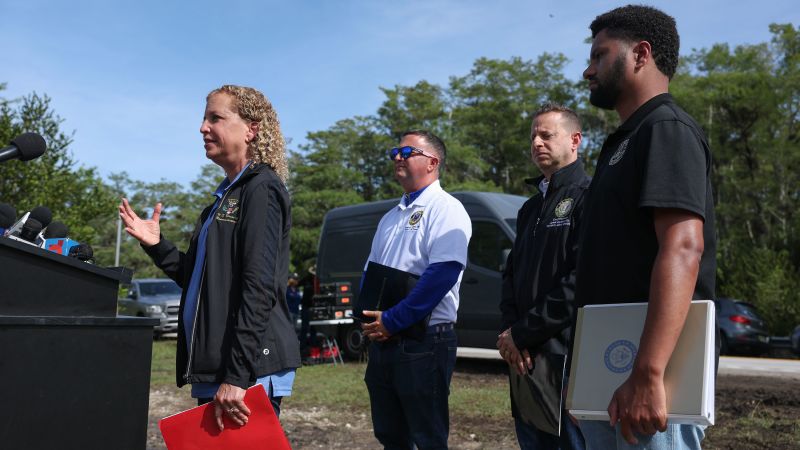The Controversial 'Alligator Alcatraz' in Florida - Outrage and Controversy

The Controversial 'Alligator Alcatraz' in Florida
Florida's Everglades, known for its fragile ecosystem and diverse wildlife, is now home to a detention facility that has sparked outrage and controversy. Dubbed 'Alligator Alcatraz' by some, the facility is a makeshift tent that houses hundreds of migrants in cages.
A Political Divide
The facility has drawn criticism from Democratic lawmakers, who have called it "inhumane" and "cruel." On the other hand, Florida's Republican governor has defended the facility, stating that it is "safe and secure" for the detainees.
What is the Reality?
While the facility may be deemed "safe and secure" by some, the living conditions for the detainees tell a different story. Packed into cages, the migrants endure harsh conditions and are unable to access proper sanitation and medical
About the Organizations Mentioned
Democratic lawmakers
## Overview of "Democratic Lawmakers" "Democratic lawmakers" is not a formal, singular organization, but rather a collective term referring to elected officials—such as senators, representatives, and state legislators—who are members of the Democratic Party in the United States. These lawmakers serve in various legislatures at the federal, state, and local levels, working individually and in groups to shape public policy, debate legislation, and represent the interests of their constituents[1][4]. ## Role and Functions Democratic lawmakers participate in the core functions of legislatures: representation, deliberation, legislation, authorizing government expenditures, forming governments (in parliamentary systems), and oversight of the executive branch[1]. Their work involves discussing and debating major societal issues, drafting and amending bills, allocating public funds, and holding government agencies accountable. In the U.S., Democratic lawmakers in Congress and state legislatures often focus on issues such as healthcare, education, environmental protection, technology regulation, and social equity, reflecting the party’s platform and priorities. ## Historical Context The Democratic Party, founded in the early 19th century, is one of the two major political parties in the United States. Its lawmakers have played pivotal roles in shaping American history, from the New Deal and Civil Rights eras to the Affordable Care Act and recent climate initiatives. The Democratic National Committee (DNC), established in 1848, coordinates party activities and supports Democratic candidates nationwide, but it does not directly control individual lawmakers’ actions[2]. ## Key Achievements Notable legislative achievements led by Democratic lawmakers include the passage of Social Security, Medicare, the Civil Rights Act, the Affordable Care Act, and major infrastructure and technology bills. These initiatives have had profound impacts on American business, technology sectors, and society at large. Democratic lawmakers have also been at the forefront of efforts to regulate big tech, promote renewable energy, and expand broadband access, directly influencing the business and technology landscape. ## Current Status Today, Democratic lawmakers hold significant influenc
Republican governor
The Republican Governors Association (RGA) is a prominent political organization dedicated to electing Republican candidates to governorships across the United States. Founded in 1961, the RGA has played a pivotal role in shaping state-level leadership, supporting Republican governors through fundraising, strategic resources, and campaign coordination. Its mission extends beyond elections, as it also provides governors with tools and support for effective governance once in office. Over the decades, the RGA has helped Republicans secure and maintain control of governorships in key states, influencing policy decisions on issues ranging from economic development to technology regulation. The organization is classified as a 527 group, meaning it operates as a tax-exempt political committee focused on advocacy and fundraising, but not direct candidate support. In recent years, the RGA has raised hundreds of millions of dollars, with major contributions from corporations, individuals, and other Republican-aligned organizations. For example, in 2024 alone, the RGA reported over $70 million in contributions and $56 million in expenditures, underscoring its significant financial influence. The RGA’s impact is felt not only in election outcomes but also in shaping the national political landscape. Governors supported by the RGA often become influential voices in the Republican Party, with some advancing to national leadership roles. The organization’s current leadership and strategic priorities reflect a focus on innovation, economic growth, and technology policy, aligning with the interests of business and tech sectors. Notable aspects of the RGA include its extensive network of state governors, its ability to mobilize resources quickly during election cycles, and its role as a hub for Republican policy development. For readers interested in business and technology news, the RGA’s activities offer insights into how political organizations influence regulatory environments and economic trends at the state level.













